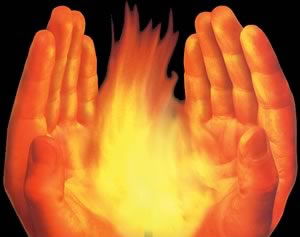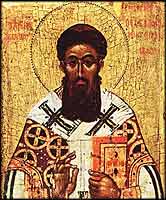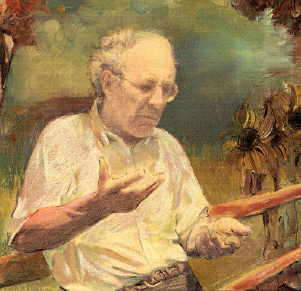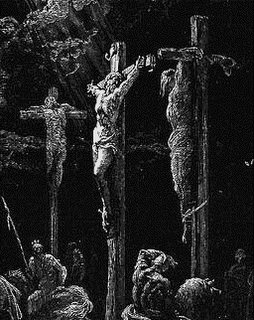As promised, for some time now, I would like to share some tips or insights on prayer, all of which have emerged from, or at least converged with, my own prayer life. Since I find them helpful for my own growth and sanctification, I want to pass them along in the hopes they may be even a little useful in your growth towards Christlikeness. Three provisos.
First, I make no claims to ‘originality’ here. If you recognize any or all this counsel as St. So-and-So’s, or as a basic Some-Order-ite practice, well, praise God He has shared the same gifts with me!
Second, living as we do in a microwave-easy, sound byte age, the age of pop-spirituality, I am very wary of labeling anything spiritually worthwhile a ‘technique’, as if spiritual growth were based on so many market breakthroughs, commodities or insider’s tips. This is why I ‘scare quote’ the word ‘technique’ (and its ilk) throughout this four-part series. There are few, if any, sure-fire ‘tricks’ in the spiritual life (à la ‘name it and claim,’ ‘pray the sinner’s prayer,’ put your hand on the TV,’ etc.).
Third, it may be a needless worry, but I should warn any of my more sensitive readers in advance there may be one or two images or phrases in this series that could scandalize them. You never know. I apologize for that, and ask you to read with a good will. In some case, I use striking images (verbal or visual) to get my point across; in other cases, I use such imagery because it pertains to the topic at hand, a topic which happens to be mature; in still other cases I use strong images to fill us with disgust for sin and strong desire for holiness.
Now, as Dostoyevsky said, to business.
First, as the title suggests, we have the ‘prayer of the palms.’ I usually use this ‘technique’ as a preparation for receiving the Most Blessed Sacrament. It works just as well, however, in any situation when you sense God approaching you or drawing you through changes towards Himself. Recall the precious words the priest says concerning the institution of the Supper (pardon my newbie-Catholic paraphrase): ‘Before His death, a death He freely accepted, Jesus took the bread, etc.’ A death He *freely* accepted. A death to which he *freely opened His life*. Why is this phrase so important? Because Christ’s free acceptance of death, coupled with our free acceptance of Christ, is the crux of the Mass.
On God’s end, the Mass is the Father’s perpetual *free* offering of Himself to sinners in His Son, who, in turn, freely gave Himself for us, by the Holy Spirit, back to His Father. On our side, though, the Mass, and Christian faith in general, entails an equally free self-offering in Christ to the Father by the Holy Spirit. The Mass not only signals, but in fact signally actualizes, the Triune God’s free opening of Himself to us. In opening His hand, or, metonymically, His deepest strength, the Father also opened His hands to release His Son into our midst in the Incarnation. In receiving the Father’s Christ, the Father’s ‘Anointed One’ in the Spirit, in our midst, in the Mass, we must open ourselves – all body, blood, soul and ‘divinizability’! – to Him in all His body, blood, soul and divinity. Here, in the action of opening and receiving, is where the prayer of the palm comes in, as a way of opening ourselves to the Lord we wish to receive.
Imagine your faculties: your will, intellect, imagination, physical energies, emotional center, etc. Now imagine
every one your faculties as a hand.

Perhaps they are copies of your own hands; perhaps they are hand-model hands; perhaps they are
doughy Mickey Mouse glove hands. However you imagine them, they are your faculties, they are your most personal ‘goods’. I choose the hands because I think they convey so many central features of being human -- flexibility, durability, intricate frailty, violent power, begging, receiving, stealing, offering, touching, pushing, pulling. (Plus, hey, ‘palm’ has better alliteration with ‘prayer’ than other body parts... except maybe ‘pancreas’, hmmm...) Your faculties do things; your hands do things. Your brain is a hand, your eyes are hands, your tongue is a hand, your
heart is a hand, and so forth. We are created to open each and every faculty of ourselves to the God from whom all good gifts, including our faculties, come (Jam 1:17). St. Paul tells us to offer our members to God as instruments of righteousness (Romans 6:14). What are our members? They are not only our anatomical parts, but also the dynamic faculties associated with, and in command of, those parts. Eyes are the members of the faculty of sight, ears of the faculty of hearing, and so forth. By imagining opening our anatomical members to God, we are in fact spiritually opening our spiritual ‘powers’ to God, and thus, to use a little Palamite terminology, uniting our powers with His.
Unfortunately, when we sin, we close our ‘hands’ against God’s love. In some cases, our sinful clenching may be aimed as fists against God. In most cases, it is we who suffer from closing in on ourselves. Luther emphasized the nature of sin as being ‘curvatus in se’, curved into itself, perhaps like an
ingrown hair or
ingrown toenail.

This is apt because all three problems – sin, ingrown nails and ingrown hairs – inflict damage upon their own ‘masters’, namely, our selves. (Incidentally, which of the three ingrowths you rank highest speaks volumes about you.) The longer we clench our fists, the more severely cramped and useless our faculties, our whole lives, become. Why do people clench their fists? Either to protect themselves or to harm others. Sin is the same: we sin either to protect ourselves from dangers or to overpower others. In either case, clenching up in sin is an idolatrous action. We clench up with fear in the shadow of idols, so-called gods, when we should instead relax in the will of God. We clench up in aggression in the service of idols. For example, we might lie to protect ourselves from the discomfort of inconvenient truths; or we lie in order to manipulate facts to the detriment of others. Or, as another example, we fornicate in fear of being unloved, or of being less than orgasmically ‘happy’, or of being ‘incomplete’, or of ‘missing out’ – all fears which are but tiny idols farcically pretending to have any stature in comparison to God’s infinite love. Alternatively, we may fornicate to impress our will for pleasure on another ‘object’ of desire, or as a way of getting a lover back, or, most primally, as a way of taking out aggression, albeit genitally, on another person.
But the Eucharist – praise God! – is where God says, ‘Enough!’ To modify a well known aphorism, God’s reign begins where our fists end, and vice versa. The Eucharist, as Calvary-for-us, is where God expels the idols, calls us out of their shadows, and tells us to unclench, to unclench from self-referential fears r from self-referential vendettas. The Mass, as the festival of God’s incipient shalom, is God’s perpetual call to peace: peace for our terrified
hearts in a dark and darkening cosmos, and peace on behalf of those we would like to pummel. The Mass is, on the one hand, the perpetual reassurance from God that we can relax and open up, while on the other hand it is His ultimatum to us that we must unclench our blood-stained fists, or they shall only be good ultimately to lock ourselves behind the doors of Hell. This why the Gospel is both, literally, good news – for the oppressed and the meek -- but also bad news – for oppressors and the arrogant. For those who, by God’s grace, remain open to God without sin grave from Mass to Mass, the Eucharist is the chance to open up even wider to Him! By preserving the gifts given from week to week, the holy Christians are open to receive even more graces and embraces into their ever growing, ever more divinized hands!

Even for those of us who do not remain open handed towards God, and who must open ourselves with the wedge of repentance, there is hope. This practice completely reorients me as what I am: a beggar always promised gifts, a child never left unfed by his Father. In every level of my being, the Mass becomes what it is in the first place: pure gift. Incidentally, insofar as the whole Mass one big runway up to the Eucharist, followed by the dénouement of our commission as renewed and reborn apostles, the two phrases I latch onto as the peak of my Eucharistic reception are: ‘Look not on our sins, O Lord, but on the faith of Your Church,’ and ‘I am not worthy to receive You, O Lord, but only say the word, and I shall be healed.’ Man, these set me aflame every time I hear them! Despite our return to closed fists, God calls us to do the small task of *opening* ourselves, which is where ‘my’ prayer of the palm ‘technique’ comes in. When I use this prayer, I imagine each faculty uncurling itself -- sometimes eagerly, other times hesitantly, slowly, sorely -- as I get ready to receive the Holy Gifts. ‘My mind, O Lord, I open to You. My eyes, O Lord, I open to You. My
heart, O Lord, I open to You. My [to be frank] genitality, O Lord, I open to You. My entire body [unfolding as one large empty palm awaiting the grace God promises] I open to You, O Lord.’ And so forth.
Ultimately, this prayer should lead to a total relinquishment of our self-possession, whether from the cloying grips of ego that hold in the imagined spotlight, or the darker, colder grip of insecurity that holds us back from the core of the Gospel: at the center of existence is love, for Existence Himself is Love. Far from a mere internal, psychological ‘trick’ for ‘enriching’ your experience of the Mass, this prayer signals the larger sacramental truth of the whole ‘Mass-event’. The prayer of the palms is meant not simply to ‘warm us up’ to God, but in fact to align with what truly and really happens before us on God’s part. Christ, once, opened His hands to the world in a free offering to the Father. Now, in the hands of the priest, He opens them again to ‘our’ world. As Jesus said in John 12, when He is lifted up, He will draw all people to Himself. Calvary was the cataclysmic and unrepeatable ‘anchoring’ of grace into the cosmos; the Mass is now the repeated '
perfusion' of that saving event. It is God’s action, both then and now. Our only role is to receive or reject Christ, to reject Him with nails back onto the Cross or receive Him afresh down from it in order to be resurrected in the tomb of our
hearts. To pray with your palms, then, is but to meet God’s own hands – dare I say ‘give Him some skin’? -- in His own prevenient sacramental advances. Far from a mere psychological ‘trick’ praying this way is to concretely, systematically, freely and mystically link yourself to the central drama of life, perhaps even to insert yourself, by grace, as a new link in the immeasurable chain of God’s love once anchored at Calvary. To ‘let yourself go’ and approach the altar in the Mass is to relinquish fears of self-sufficiency, and insufficiency, to respond to the great dare that is Christianity: despite our fears wounds and sins, the God Himself chooses to meet us, to heal us, to feed us. Will we open our faculties?
One ‘faculty’ I didn’t consider opening until more recently is my future. Now, however, I try to open this ‘faculty’, this mode of volitional power, to God by imaging my whole self – in the totality of my memories, wounds, hopes, fears and present situations – stretching prostrate before God into a future I grant only Him to know for me. Of course, it now dawns on me that opening our future to Christ in the Eucharist is but one dimension of the cosmos which, having been redeemed by Him, now in fact resides in Christ.
15He is the image of the invisible God, the firstborn over all creation. 16For by him all things were created: things in heaven and on earth, visible and invisible, whether thrones or powers or rulers or authorities; all things were created by him and for him. 17He is before all things, and in him all things hold together. 18And he is the head of the body, the church; he is the beginning and the firstborn from among the dead, so that in everything he might have the supremacy. 19For God was pleased to have all his fullness dwell in him, 20and through him to reconcile to himself all things, whether things on earth or things in heaven, by making peace through his blood, shed on the cross.
(Col 1:15-20)
35Who shall separate us from the love of Christ? Shall trouble or hardship or persecution or famine or nakedness or danger or sword? 36As it is written:
"For your sake we face death all day long;
we are considered as sheep to be slaughtered."
37No, in all these things we are more than conquerors through him who loved us. 38For I am convinced that neither death nor life, neither angels nor demons, neither the present nor the future, nor any powers, 39neither height nor depth, nor anything else in all creation, will be able to separate us from the love of God that is in Christ Jesus our Lord.
(Romans 8:35-39)
The Eucharist is the feast of the Incarnation, and therefore makes everyday not just this or that Saint’s feast day, but rather, God’s daily jubilee banquet (wherein a certain Saint is but the emcee, as it were, for that day). The Mass may celebrate it, but what is the Incarnation? It is God’s total immersion of Himself as Love into our fallen world as Beloved. His self-immersion is redemptive of all creation; it touches and transfigures every dimension of reality – both time and space as well as super-time and super-space. ‘The earth is the Lord’s and the fullness thereof!’ says Psalm 24:1. The Eucharist, then, is our portion of this Cosmic Feast. In consuming (quite literally!) the Host of the Feast, He extends us beyond ourselves into a total harmony with the rest of His redeemed territory, both personal and temporal, both superpersonal and supratemporal.
Hence, opening the ‘palm’ of our future to God is but our share of unclenching into the temporal dimensions of Redemption. The Eucharist connects us to the *past* by virtue (Latin, virtus = power) of its *memorial* dimension. It connects us to the *present* by virtue of the sensual *immediacy* of the liturgy and what concrete situations, pressures, feelings, ailments, etc. we bring with us up to the Offering. Finally, the Eucharist connects us to the *future* not only by filling us with *anticipation* to receive the Lord in each temporal Mass, but also by pressing yet more deeply into us the marks of Christ, the fruit of His Holy Spirit, as our spiritual deposit for the *eschatological* Feast of His Return (cf. 2 Cor 1:22, 5:5; Eph 1:14; Rev 22:1-5).
So much for the temporal aspects of the Mass and our prayer of the palm. What of its personal, ‘horizontal’ dimensions? Again, as man is a personal and social being, the Eucharist grasps both dimensions for our total redemption. Jesus sent his Apostles to be fishers of men and as their successors celebrate the Mass, men are fished into the Kingdom, caught as it were by the mouth with the hook of grace that we swallow with, and as, the Eucharist. In this way, the Eucharist draws us in personally. Just as our hands move multidirectionally, so too the prayer of the palm, like all Christian prayer, must work multidirectionally. We must not simply open our palms *upward to God*, and not only *downward into ourselves* with sober humility, but also *outward* in loving openness to our *neighbor*.

To pray the prayer of the palm is to open to God; to open to the ‘you’ He created; and to open to the ‘them’ for whom He also died. Interestingly, the same word St. Paul uses in Romans 6 about our (personal) members, he uses elsewhere to describe our collective, mystical union with each other in Christ (cf. Rom 12; 1 Cor 12; Eph 4:25)! By giving our members, our powers, our faculties, to Christ in the Eucharist, He in effect *returns us to each other* so that those same powers, now divinized and transfigured *in Him*, may be put to mutual service in the church. By celebrating the Feast with others – by freely biting the same Hook as they do – we are redeemed in a social, communal, opened way. As we freely and collectively enter the Net of God’s love, we are all raised up to the Cross as co-sufferers, co-offerings, with Christ *and* with each other. We go from being 'curvatus in se' to 'curvatus in Deum et in aliam' (curved into God and others). Perhaps the prayer of the palms can help you appreciate this truth. Try it; maybe even let me know.







